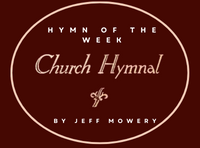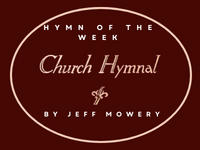We’re Marching to Zion
Come, we that love the Lord,
and let our joys be known;
join in a song with sweet accord,
join in a song with sweet accord
and thus surround the throne,
and thus surround the throne.
Chorus
We’re marching to Zion,
beautiful, beautiful Zion;
we’re marching upward to Zion,
the beautiful city of God.
Let those refuse to sing
who never knew our God;
but children of the heavenly King,
but children of the heavenly King
may speak their joys abroad,
may speak their joys abroad.
The hill of Zion yields
a thousand sacred sweets
before we reach the heavenly fields,
before we reach the heavenly fields,
or walk the golden streets,
or walk the golden streets.
Then let our songs abound,
and every tear be dry;
we’re marching through Emmanuel’s ground,
we’re marching through Emmanuel’s ground,
to fairer worlds on high,
to fairer worlds on high.
I thought of this hymn recently when I listened to a devotional message based upon a passage of Scripture found in Psalm 137. The verses I want to highlight are 1-6 which read as follows:
“By the rivers of Babylon we sat and wept
when we remembered Zion.
There on the poplars
we hung our harps,
for there our captors asked us for songs,
our tormentors demanded songs of joy;
they said, “Sing us one of the songs of Zion!”
How can we sing the songs of the LORD
while in a foreign land?
If I forget you, O Jerusalem,
may my right hand forget its skill .
May my tongue cling to the roof of my mouth
if I do not remember you,
if I do not consider Jerusalem
my highest joy.”
This song is from the point of view of those Israelites who had been taken captive into a foreign land. They are so mournful and depressed that they hang their harps in the poplars. They wonder – “Will we ever be able to sing the songs of Zion?” Their captors mocked them and made fun of them urging them to sing the songs of Zion, but they could not. I wondered if that passage of Scripture represents us sometimes. Have the trials and tribulations we are dealing with on a daily basis stolen our song? Have we hung up our harps in the trees because we think there is nothing left to sing about? I also wonder if this passage of Scripture gives us some insight into finding our song again. Maybe if we return our focus to “Zion” or to the “New Jerusalem” – return our focus to Heaven – if our songs would be different. If we focused on Heaven – a place where there are no problems, no pain, I think we would change our tune. If we focused on the place where there is rejoicing forever, a place where there is singing – singing of praise to the One that saved us from our sins, I am confident we would be different. I think it is hard to think about the beauty and benefits of Heaven without singing a song in our heart.
Couple of comments on the lyrics:
- “Marching upward to Zion” – Two key words here. Marching and upward. We shouldn’t be “strolling” to Zion or “wandering” to Zion. No we should be marching – with purpose, with intensity because we know where we are going. Secondly, we should be marching upward. Upward to a better place. Upward to a higher place. We aren’t heading downhill. We are marching upward to the beautiful city of God.
- “Before we reach the heavenly fields” – Because of God’s love for us, He not only has prepared a wonderful place for us when we die, or when we meet Him in the air. He also provides “sacred sweets” before we reach the “heavenly fields.” Those “sacred sweets” are the daily blessings we receive while on earth. Another day of life. Another day to share with one another. New babies that are born everyday. New joys of helping someone find Christ. Each of those things are blessings that happen before we get to Heaven, and we ought to be truly grateful for those “sacred sweets.”
I wanted to share the quick background of this hymn. Issac Watts, considered by many to be the Father of Christian Hymnody, wrote this song and other famous songs like “Joy to the World” and “When I Survey the Wondrous Cross.” This hymn was written in response to a trend in the churches of his day. Many people were opposed to singing hymns in the church. They would only want to sing the Psalms and other parts of Scripture. Churches accommodated and they would sing the Psalms and the Scripture at the beginning of a service, and then after the sermon, they would sing hymns. Many people would walk out of the church when the hymns were sung in protest. If you reread verse two, you can see the author’s indictment of those people who he says “refuse to sing.”
I found this rather interesting because something completely different is now happening in the modern church. In many places, we have abandoned hymns in an effort to accommodate the current tastes of the congregation. In some instances, churches have also brought in secular songs because of their popularity of the song or because of a song’s “positive” message. As one who loves hymns, this is disheartening. Although there are some good modern choruses, I believe these great old hymns are packed full of encouragement, doctrine, and many times full of Scripture or Scripture references. This is one area that is lacking often times in modern choruses.
I personally hope that we have a “revival” of old hymns like “We’re Marching to Zion” since they are such an important part of our Christian history, and because they are full of solid Biblical truth. I also hope we don’t join the camp that folds our arms, and in protest, refuse to sing praise to the Lord. That too, is not the right Christian response. We have lots of things to be grateful for, and lots of things to sing about. So let’s continue to encourage one another. Let’s take our harps out of the poplars, and sing the “songs of Zion.” We have so much to sing about.

